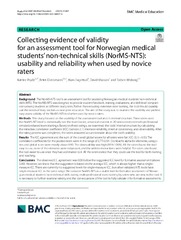Collecting evidence of validity for an assessment tool for Norwegian medical students' non-technical skills (NorMS-NTS): usability and reliability when used by novice raters
Permanent lenke
https://hdl.handle.net/10037/31949Dato
2023-11-15Type
Journal articleTidsskriftartikkel
Peer reviewed
Sammendrag
Methods - This study focused on the usability of the assessment tool and its internal structure. Three raters used the NorMS-NTS tool to individually rate the team leader, a medical student, in 20 video-recorded multi-professional simulation-based team trainings. Based on these ratings, we examined the tools’ internal structure by calculating the intraclass correlation coefficient (ICC) (version 3.1) interrater reliability, internal consistency, and observability. After the rating process was completed, the raters answered a questionnaire about the tool’s usability.
Results - The ICC agreement and the sum of the overall global scores for all raters were fair: ICC (3,1) = 0.53. The correlation coefficients for the pooled raters were in the range of 0.77–0.91. Cronbach’s alpha for elements, categories and global score were mostly above 0.90. The observability was high (95%-100%). All the raters found the tool easy to use, none of the elements were redundant, and the written instructions were helpful. The raters also found the tool easier to use once they had acclimated to it. All the raters stated that they could use the tool for both training and teaching.
Conclusions - The observed ICC agreement was 0.08 below the suggested ICC level for formative assessment (above 0.60). However, we know that the suggestion is based on the average ICC, which is always higher than a single-measure ICC. There are currently no suggested levels for single-measure ICC, but other validated NTS tools have single-measure ICC in the same range. We consider NorMS-NTS as a usable tool for formative assessment of Norwegian medical students’ non-technical skills during multi-professional team training by raters who are new to the tool. It is necessary to further examine validity and the consequences of the tool to fully validate it for formative assessments.


 English
English norsk
norsk
